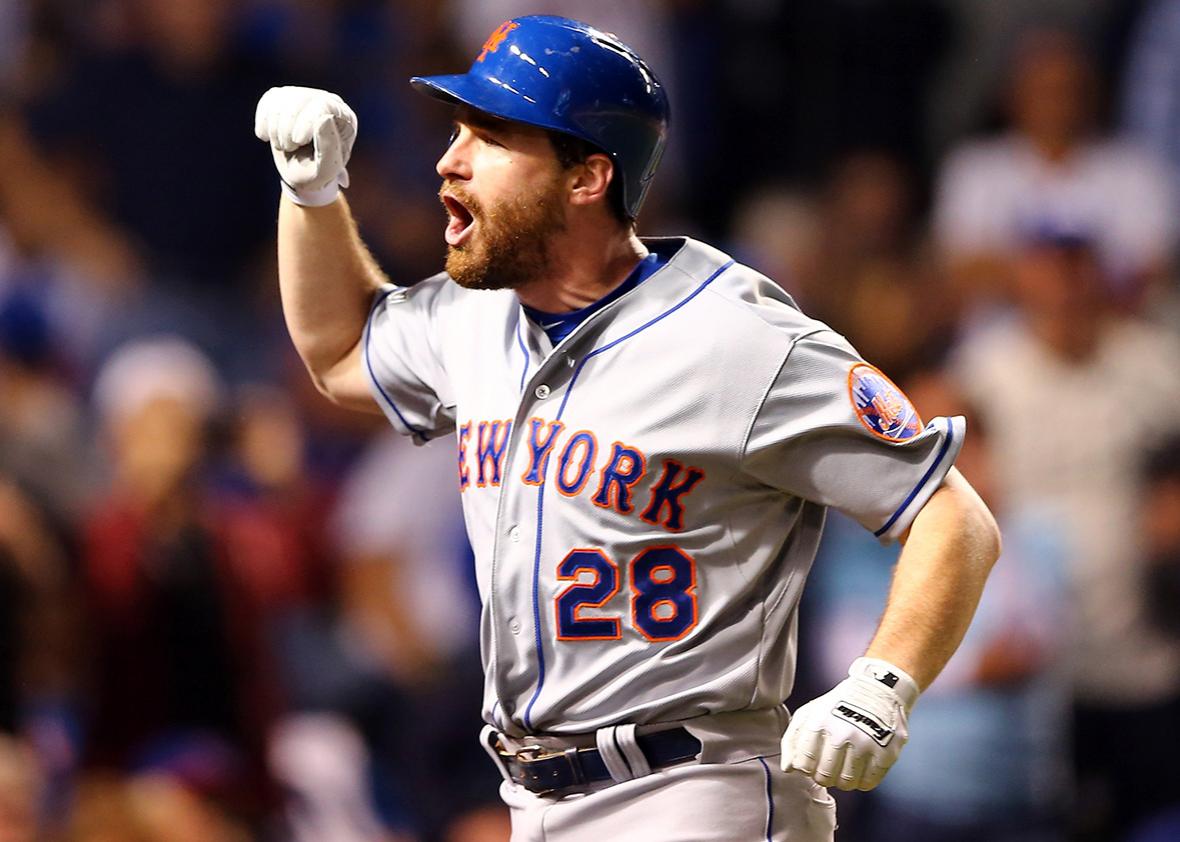More than two weeks ago Belarus elected Alexander Lukashenko, or rather re-re-re-re-elected president-since-1994 Lukashenko, with 83 percent of the ballot. But for truly foregone conclusions look not to Eastern European elections, but to the National League Championship Series, where Mets second basemen Daniel Murphy was voted series MVP after hitting a home run in every game, ending Game 1 with a diving stab at second, and probably effortlessly outpolling Belarusian opposition candidate Tatsiana Karatkevich as part of his hot streak.
And what a hot streak! Murphy is normally the kind of line-drive hitter who rarely strikes out and can spray the ball to all fields, and thus consistently earns the description “professional hitter” (a curious term in the world of for-profit baseball). His 14 home runs this year were a nice little bit of pop in what was, for most of the season, a rather desultory Mets offense, and over his career he has homered just once out of every 58 plate appearances. But in this postseason he has seven homers, including one in each of the past six straight games, for a rate of nearly one dinger per five times up to bat.
It wouldn’t be sour grapes for Cubs fans—or Dodgers fans before them—to rationalize as fluky their teams’ losses at the hands of a hitter experiencing a Bruce Banner–esque transformation at the plate. But there are a few mitigating factors that spell out why the Mets are a sound team up and down, well beyond even their one surprising star.
First of all, while it’s true that Murphy’s hot streak is highly improbable (advanced metrics project him to hit only 11 home runs all of next season), it is likely that someone on the team would get on a hot streak. The human mind naturally asks, “This guy?!?” when a Murphy-like blossoming happens, but it fails to ask, “Why not that guy?” when another player’s hot streak or career hitting strength doesn’t translate into the postseason. For instance, after a trade brought him to the Mets on July 31, Yoenis Cespedes had 42 RBIs and hit a home run nearly every other game in his first 41 games, which—just in case you are only familiar with home run rates vis-à-vis Daniel Murphy’s 2015 postseason—is unbelievably impressive. But in the playoffs Cespedes cooled. Likewise Lucas Duda, who led the team in home runs and RBIs this year, was mired in a 3-for-24 slump up until Game 4 of the NLCS when the Cubs decided to toss him batting practice. David Wright, the Mets’ best offensive player of all time, was so bad during the Division Series against the Dodgers (1-for-16) that Mets manager Terry Collins fended off calls to move him down in the lineup.
The point is that although Murphy’s hot streak is unlikely, it was balanced by cold streaks that were little noticed and also unlikely. Another way of looking at it is this: While it’s unlikely that you will win the lottery, it is likely that someone will win the lottery.
Less susceptible to the vagaries of chance were the great Mets pitchers. Starters Matt Harvey, Jacob deGrom, Noah Syndergaard, and to a lesser extent Steven Matz all delivered with consistency that was expected. The young arms were excellent during the regular season, excellent during the playoffs, and there’s every indication that they’ll be excellent in the World Series. And while it’s fun for scribes and fans to scroll through Baseball Reference to come up with statistics to contextualize Murphy’s unprecedented “yowza” (one statistician calculated his odds of breaking the consecutive home run record as “one in a million”), the Mets’ arms are less freakish but actually more important to the team’s success.
The pitchers, including closer Jeurys Familia (who yielded only two hits and zero runs against the 33 batters he faced this postseason), are the best complete staff in baseball. In fact, while it’s true that the Mets had the worst record of any National League playoff team, I would argue that they are the best team for the playoffs—especially the rounds played in a best-of-seven-games format that maximizes the importance of staff depth. Also, consider that the Mets’ offense did not include for most of the season Wright, Cespedes, power-hitting rookie Michael Conforto, or catcher Travis d’Arnaud, four of their top six hitters in OPS (Murphy was seventh). Add that late-breaking offensive firepower, plus the consistently daunting pitchers, and, yes, the second baseman’s bat that’s been dipped in the river Styx, bombarded with gamma rays, or carved from a tree struck by lightning on the Hobbs family farm and the fair conclusion is that the Mets deserve to be the World Series favorites.
